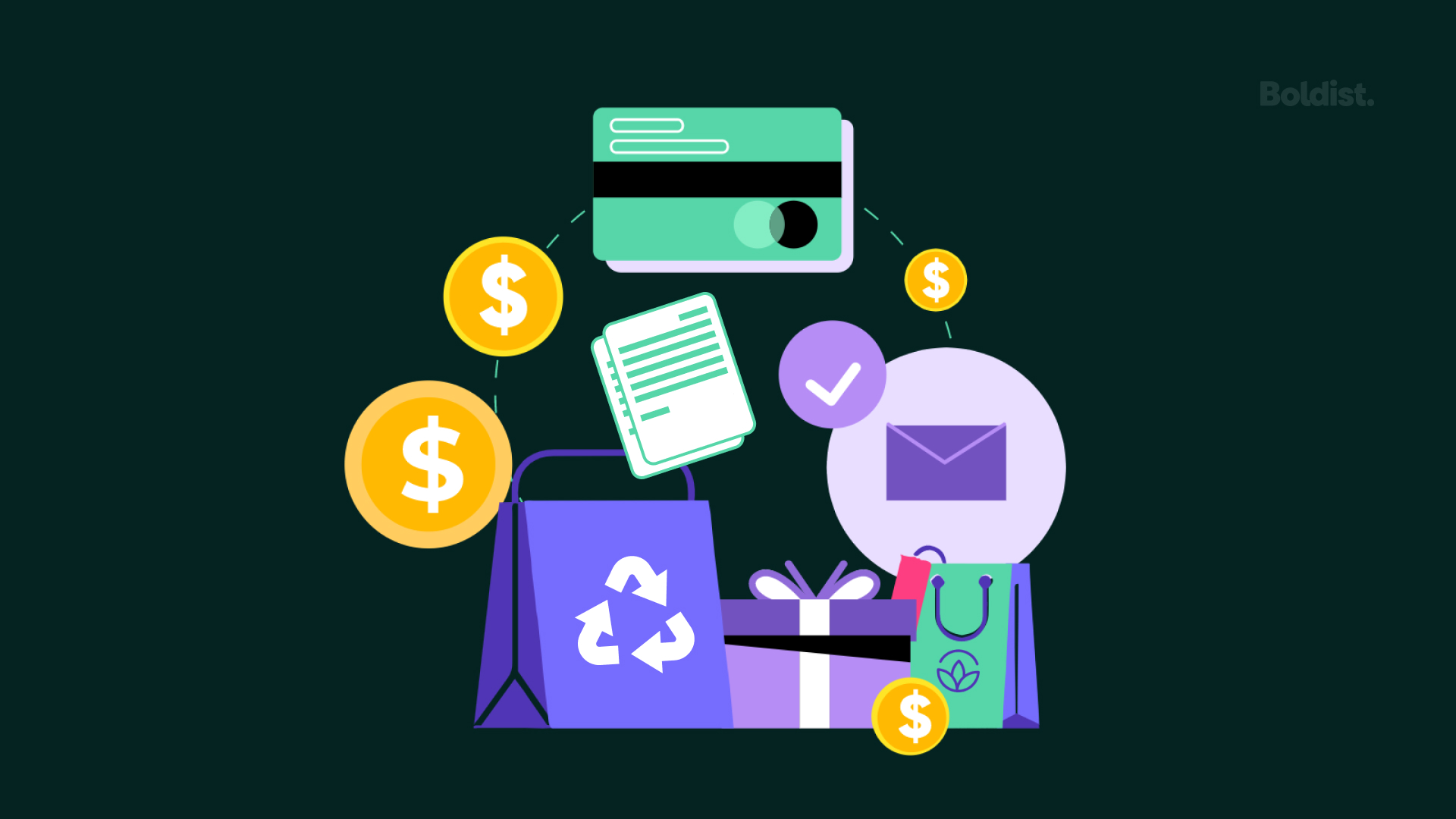Climate change becomes more pressing every year. All generations, especially younger ones, want to see more companies for sustainability. And Millennials and Gen Z are making more and more purchasing decisions based on company ethics, including sustainability initiatives.
While businesses increasingly recognize the need for action, only 60% have a sustainability strategy. (And we’re sure even fewer are acting on it.)
But that doesn’t take you off the hook or mean there’s no one to inspire you.
If you want to join the ranks of eco-friendly ecommerce leaders—and take advantage of the many benefits of running a sustainable ecommerce business—we’ve got just the list of green brands to look up to.
Copy them verbatim if you want. Or, better yet, use them to get your creative, environmentally friendly juices flowing.
First, What Is Sustainability for an Online Business?
We’re big fans of planet Earth, so we’ve talked about sustainability before, but in case you missed it, here’s what we mean:
A sustainable online business balances profits with its social and environmental impact. This includes making community and environmental impact part of your success metrics and goals.
There’s a huge difference between green marketing and committing to environmental sustainability.
As you read about the sustainable business examples below, observe their efforts across sourcing, production, and distribution.
Note:
Not all of these environmentally friendly companies sell exclusively online, but they don’t need to for the online portion of their business to play a big role in sales. You also don’t need to be a giant corporation or a family-run first-generation business. And, perhaps most importantly, it’s okay if you didn’t found your business to save the planet or don’t have a name like Green Leaf Accoutrements. No matter who you are or what you do, you can do sustainability.
1. Tropic Skincare
Tropic Skincare sells skincare and cosmetics products.
Here’s their sustainability highlight reel:
- Responsibly sourced and cruelty-free ingredients
- Certified CarbonNeutral
- 100% compostable and recyclable parcels
- Landfill-free: They recycle all byproducts and repurpose anything they can’t recycle into alternative fuel to replace fossil fuels.
- Refillable products: At the time of this article, Tropic Skincare offers a refill option for their signature hand wash, bath foam, natural serums and oils, lipstick cartridges, mineral foundation, and matte setting powder to reduce packaging waste.
- Donations: Tropic Skincare donates 10% of their profits to charities that help create a healthier, greener, more empowered world.
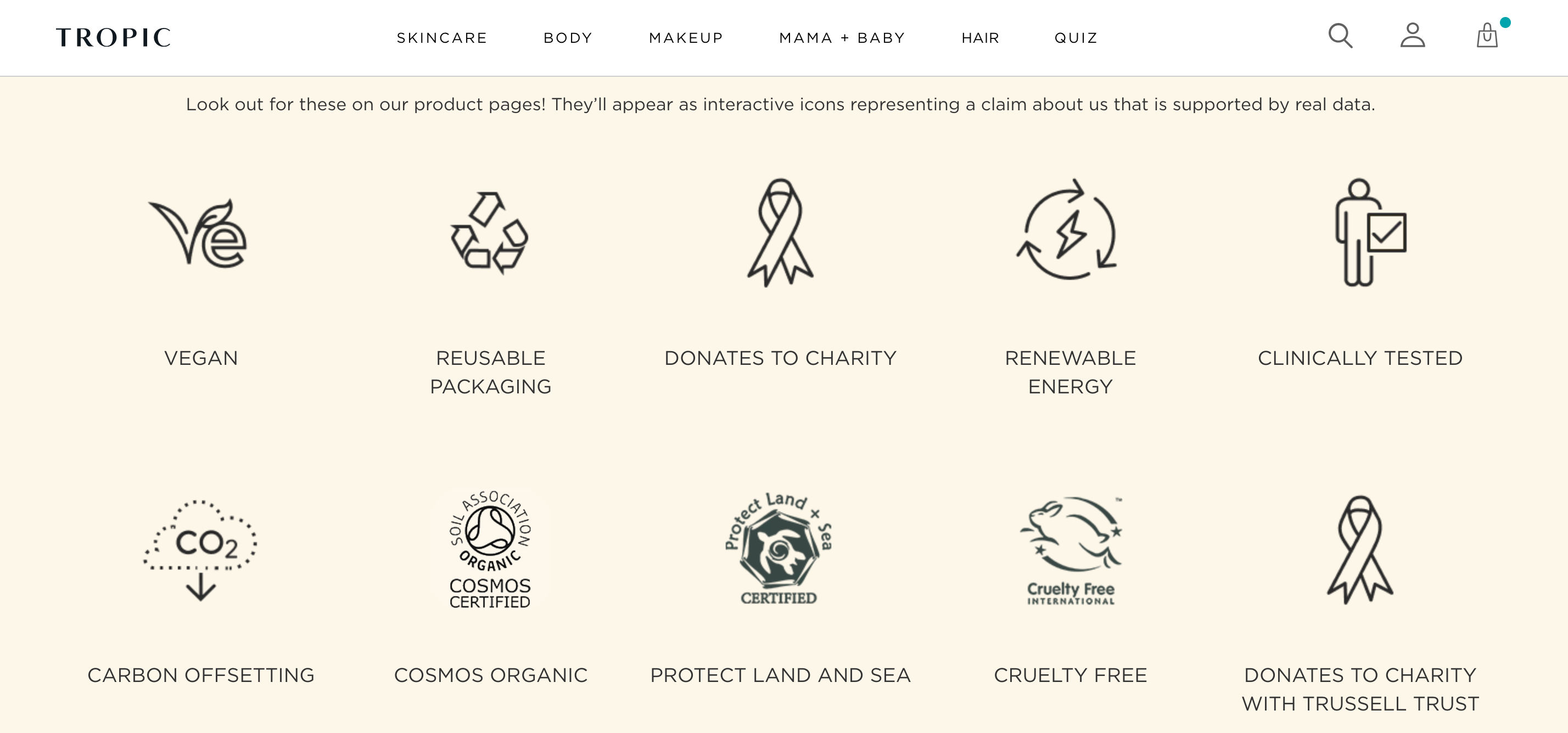
2. Patagonia
Big-timer outdoor and sports store Patagonia is famous for their sustainability efforts and is likely the most environmentally friendly brand out there. Their initiatives list is long, but here’s a taste:
- Material traceability and responsible sourcing
- Landfill reduction: Patagonia is one of the few sustainable companies with a recommerce program. Through Worn Wear, you can return used clothing and gear for store credit, and Patagonia will resell it at a discount or recycle it.
- Pledge to go Carbon Neutral by 2025: This is an example of how you can share your sustainability goals in advance—so long as you’re taking action.
- 1% for the Planet: Patagonia donates 1% of sales to the preservation and restoration of the natural environment. Since 1985, they’ve donated $140 million.
- Grassroots grants: Patagonia also funds environmental organizations through a grant program.
- Political action: In 2017, Patagonia sued President Trump to protect Bears Ears National Monument.
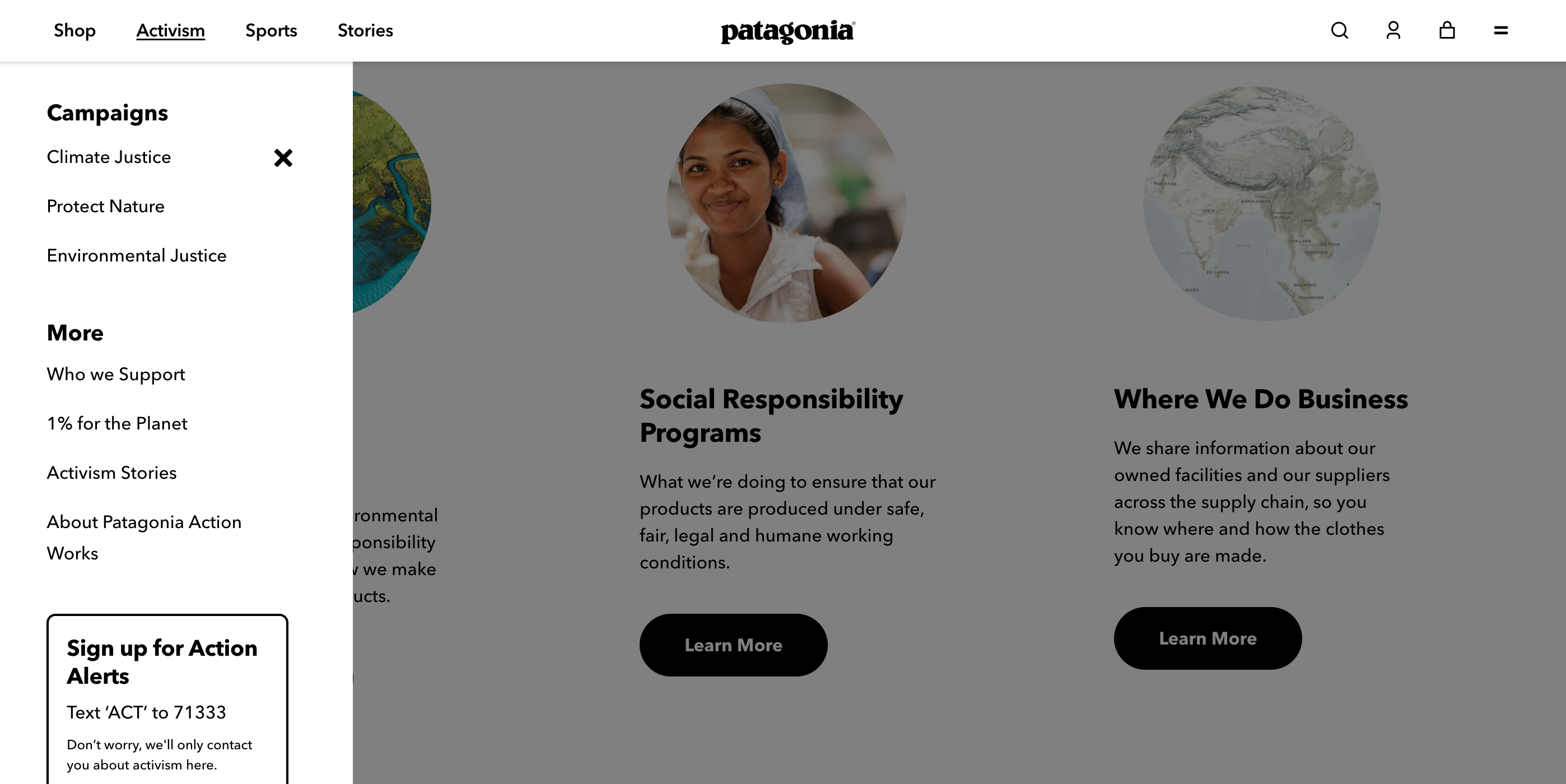
3. Pela
Pela has had eco-friendliness at the heart of their business from the beginning, but their initiatives can still inspire those who haven’t. They sell phone cases and accessories but are best known for inventing the world’s first 100% compostable phone case.
Here’s what else they’re doing for the planet:
- Climate Neutral Certified
- Sustainable materials: Pela uses raw materials partially or wholly derived from renewable sources, like plants or microorganisms.
- Sustainable distribution efforts: Pela added centers in Canada and Europe to streamline distribution routes and reduce emissions.
- Pela 360: With the Pela 360 program, the company takes “responsibility for Pela products throughout their entire life cycle.” When customers order a phone case, it comes with an extra envelope for returning their old Pela case or conventional plastic case. The company upcycles returned cases into new Pela products or ensures they’re recycled properly.
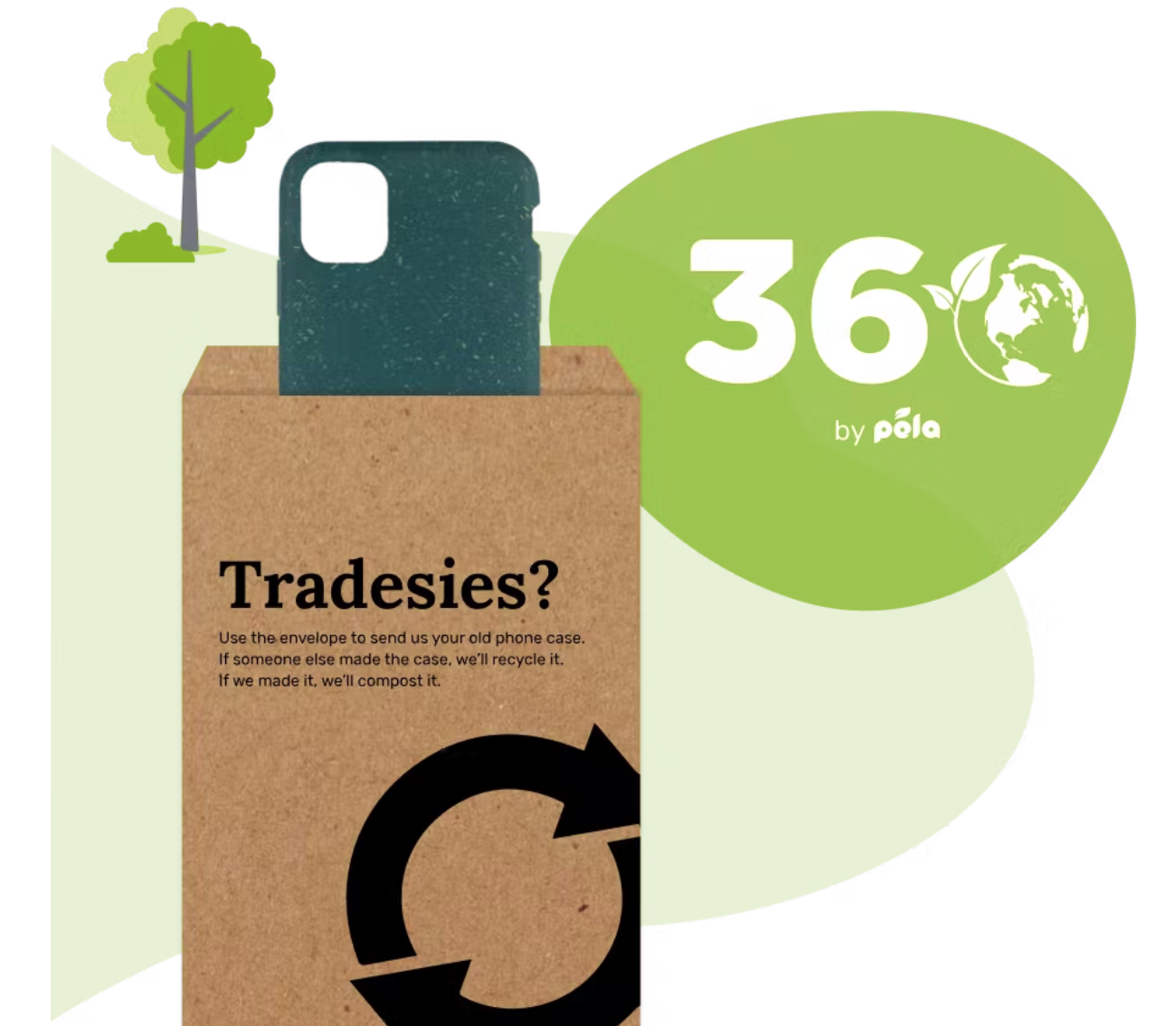
4. Allbirds
Allbirds sells shoes with a side of apparel. They’re also innovators in the ecommerce sustainability space, having been “the first” to do a lot.
Here’s a synopsis of Allbirds’s sustainability initiatives:
- Climate Neutral Certified
- Regenerative agriculture: Allbirds is working on the switch to regenerative sourcing for 100% of their wool.
- Renewable materials: With a goal to achieve 75% sustainably sourced natural and recycled materials by 2025, Allbirds has innovated to replace petroleum-based synthetic materials with natural alternatives. Per their website, “When we haven’t found suitable alternatives, we’ve either invented our own—like SweetFoam®, our shoe sole material derived from the world’s first carbon negative green EVA—or invested in novel solutions, like Plant Leather, our 100% natural, plant-based leather.”
- Carbon footprint reduction: One of the few environmentally sustainable companies to do more than buy carbon offsets, Allbird’s has pledged to bring their carbon footprint to zero. Their current goal is to cut their carbon footprint in half by the end of 2025 and reach near zero by 2030.
- Product emissions nutrition label: So you’ve counted calories, but have you ever counted your shopping emissions? Allbirds was the first company to add each product’s associated emissions to their product descriptions. For example, their “Canvas Pacer has a carbon footprint of 7.99 kg CO2e.” This effort promotes transparency and encourages consumer awareness.
- Open-source carbon footprint calculator: Eco-friendliness is still a point of competitive differentiation, but that didn’t stop Allbirds from making their carbon footprint tool available (and free) to their competitors, along with a manual on how to use it.
Per their website: “We know that sharing proprietary information might not make the most business sense. But the global climate crisis is bigger than business.”
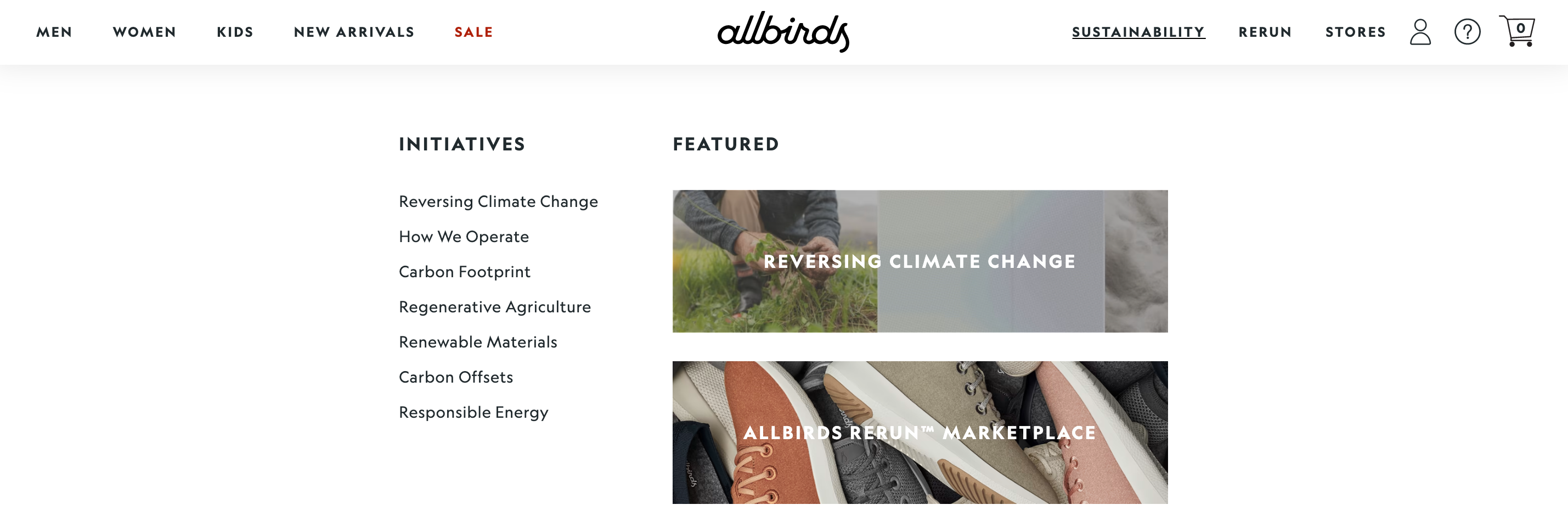
5. Estée Lauder
If we were nominating eco-friendly brands for their transparent goal-setting abilities, Estee Lauder would pose tough competition. They’ve also maintained an impressive zero-waste-to-landfill commitment:
- Radical landfill avoidance: Since 2003, Estee Lauder has prevented all its manufacturing and distribution sites in the United States, Canada, United Kingdom, Belgium, and Switzerland from contributing to a single landfill. Any waste they can’t reuse or recycle, they convert to energy through a licensed power plant or by co-processing through cement kilns.
- Electric vehicles: They aim to transition 100% of their global corporate vehicle fleet to electric by the end of 2030.
- Carbon footprint reduction: They’ve also set goals to reduce absolute Scope 1 and 2 GHG emissions by 50% and to reduce Scope 3 GHG emissions (from purchased goods and services, upstream transportation and distribution, and business travel) by 60% by the end of 2030.
- Sustainable packaging: When it comes to packaging, the company aims to accomplish the following by 2025—
- Making 75-100% of packaging either recyclable, refillable, reusable, recycled, or recoverable.
- Increasing the amount of post-consumer recycled material in packaging by up to 50%.
- Getting 100% of their forest-based fiber cartons FSC-certified.
- Carbon offsetting for distribution: Estee Lauder funds emission reduction projects to offset the CO2 emissions from their U.S. fulfillment center deliveries. They admit that this initiative currently excludes buy online, in-store pickup, and same-day delivery.
Overall, we’re fans of their vice president of sustainability’s perspective:
“There’s no such thing as a sustainable company. Sustainability is a journey. So every company can improve. The issues we are managing today weren’t even thought of five years ago. I’m always amazed how many new issues are coming at us all the time…and we need to set up processes to manage these things.”
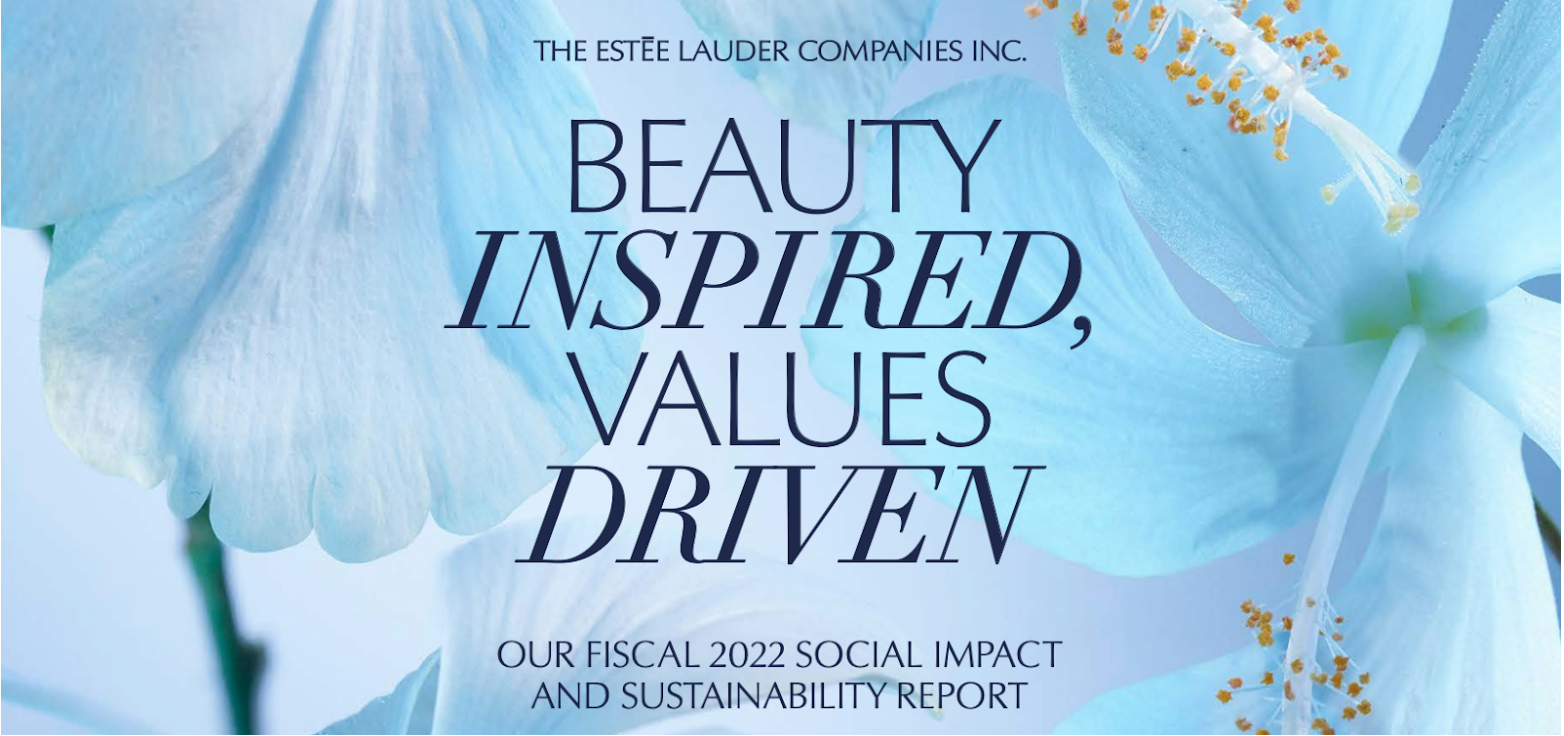
6. IKEA
You know IKEA—genius furniture store famous for their Swedish meatballs (when shopping in-person, anyway). Well, they, too, have made moves in favor of Earth:
- Renewable energy: They have 100% renewable energy initiatives in the works.
- Sustainable materials: Right now, 60% of IKEA products are made of renewable materials. Their goal is to go 100% renewable or recyclable by 2030.
- Forest-positive: Over 98% of the wood IKEA uses for IKEA products is either FSC-certified or recycled, and they aim to ensure their other raw materials (soy, palm oil, beef, leather, coffee, cocoa, rubber, and sugarcane) are deforestation-free by the end of 2025.
- Waste reduction via demand sensing: Ikea uses AI to achieve near 98% accuracy when forecasting demand across hundreds of stores and 54 ecommerce markets. This prevents waste from overstocking.

7. BrewDog
We’ll admit first that we’re fans of BrewDog and even wrote about them in 2020, but that doesn’t change the fact that they were the first carbon-negative beer business—ever.
Here are a few of BrewDog’s initiatives that we covered back in the day:
- Carbon reduction: BrewDog pledged to remove twice the amount of carbon emissions from their production, operations, and supply chain from the atmosphere.
- Waste reduction: They’re known for reducing food waste by using surplus fresh bread to make beer. They also turn spent grain, a brewing byproduct, into green gas, renewable vehicle fuel, and organic fertilizer.
- Electric: They continue to make the switch to electric vehicles.
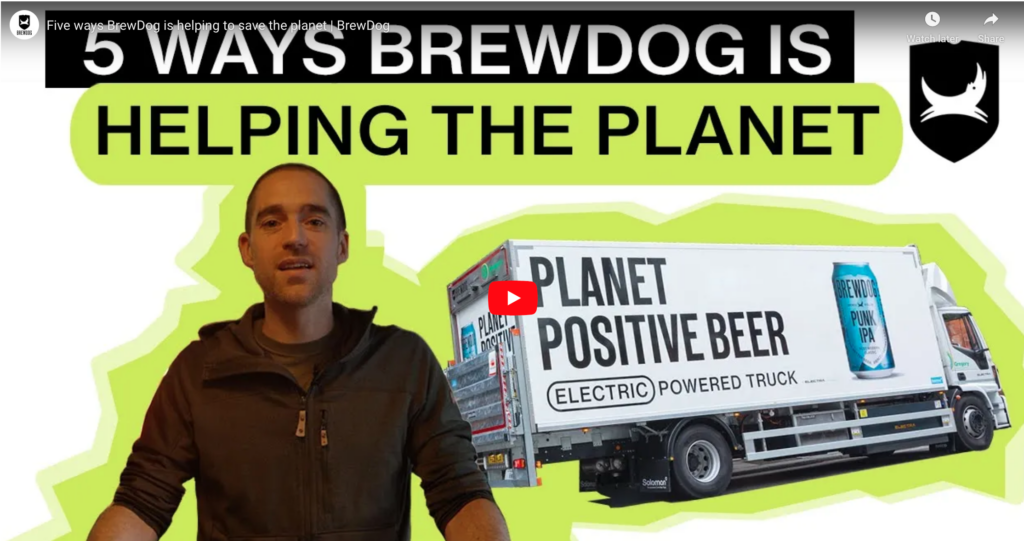
8. A Good Company
A Good Company makes sustainable alternatives for everyday products and pushes other companies to do the same. Here’s how they’re doing it:
- Transparency: A Good Company shares all their sustainability initiatives on their website, from materials used to new product ideas and product development. Revealing their secrets encourages consumers to be more conscious of what they buy and pushes the company to stay innovative.
- Stone paper: They invented stone paper and used it to make the world’s first climate-positive notebook.
- Packaging: They also make their packaging out of their climate-positive stone paper, eliminate tape, and use soy-based ink.
- Sharing is caring: To encourage other ecommerce businesses to use sustainable shipping materials, A Good Company sells their stone paper shipping material at cost.
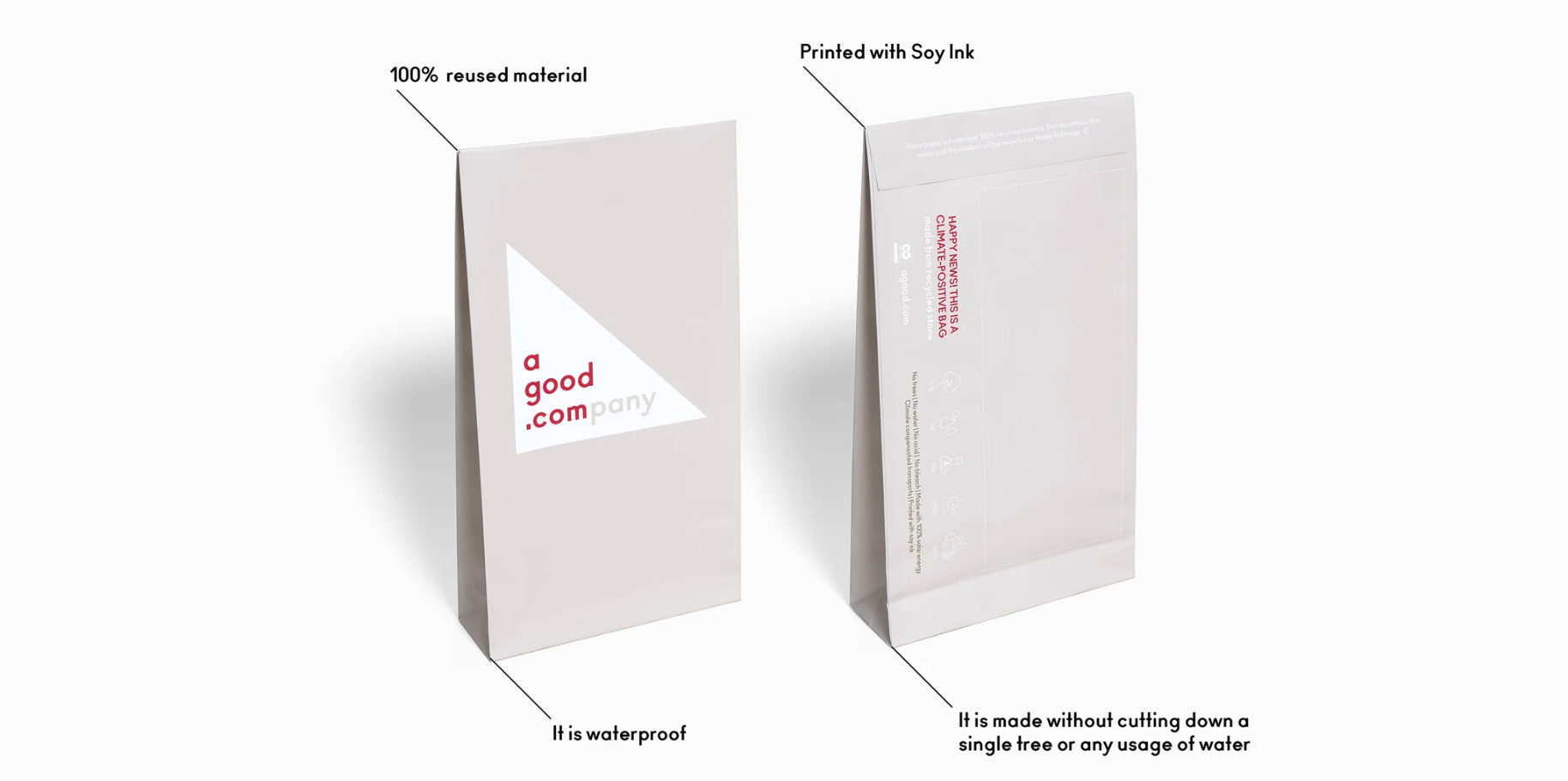
9. Dr. Bronners
Dr. Bronners was founded in 1948, but that hasn’t stopped them from growing with the times. Another soap and personal care products company, here’s how they’re keeping green:
- Eco-friendly ingredients: Dr. Bronner’s products have earned several organic and fair trade certifications, and they source from farmers using regenerative agriculture and dynamic agroforestry.
- Product and shipping packaging: Dr. Bronner’s plastic bottles are 100% recyclable, and they only use 100% post-consumer recycled material for their shipping boxes. They’ve also made their shipping boxes 30% thinner and have removed 90% of the dividers they once used.
- Company principles: Dr. Bronner’s places emphasis on sustainability efforts by including it in their six “Cosmic Principles,” which each support a variety of company initiatives, including equitable supply chains, footprint reduction, packaging innovations, animal advocacy, and more.
- Donations: Dr. Bronner’s donates a large portion of their profits to green and social initiatives. In 2021, they donated 40% of profits, totaling $8.6 million, to approximately 300 organizations across animal advocacy, drug policy reform, regenerative organic agriculture, fair pay and fair trade, criminal justice reform, and community betterment.
- Transparency: The company is also as open about their environmental footprint as they are about their efforts. You can find their stats for waste generation, gallons of water used, greenhouse gas emissions, and more in their annual company report.
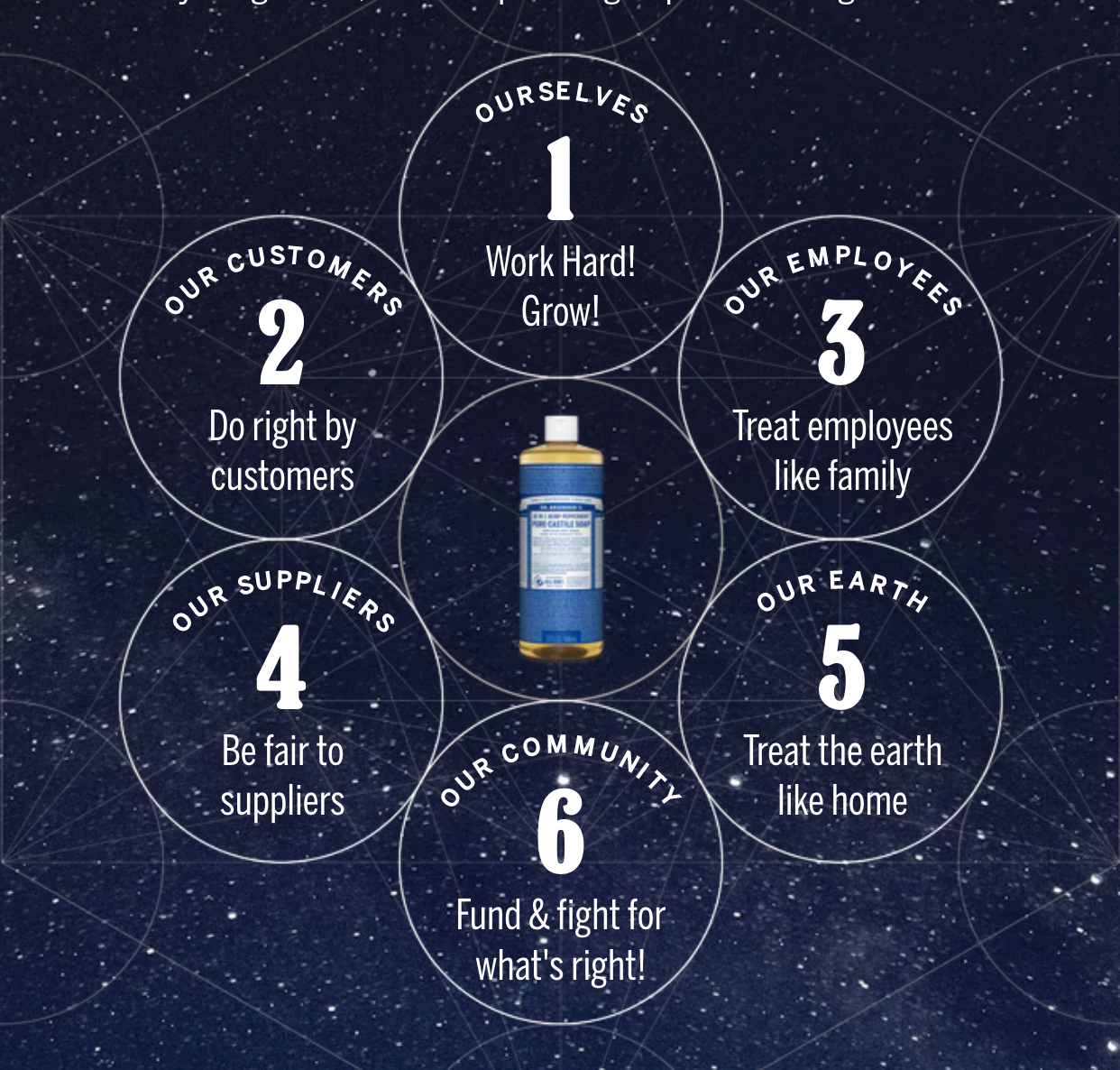
10. Veja
French fashion footwear brand Veja consistently works towards sustainable business practices and is honest when they make choices that don’t comply. We commend Veja for:
- Material sourcing: The company sources their shoe materials from organic farms that practice ecological agriculture.
- Petroleum reduction: Veja often uses reclaimed materials to minimize the use of petroleum in their shoe-making.
- Discouraging over-consumption: The company has launched two locations to clean and repair customers’ old shoes—Veja or otherwise. They recycle those they can’t repair.
- Transparency: We’re huge fans of how straightforward Veja is about their sustainability limitations as a company. Their website’s Limits page shares details like, “the pigments we use to dye leather, rubber, and cotton aren’t natural products” and “our ecommerce website still relies on banking partners with branches in tax havens.”

11. Blueland
Cleaning products have received a lot of consumer skepticism and lash back over the last several years, which might explain why so many of the top green companies on our list sell environmentally sound cleaning supplies. Blueland is another of these mindful brands. They’re recognized for the following:
- Climate Neutral Certified
- Reuse and refill initiatives: All Blueland bottles and product containers are reusable and refillable. The company is well-known for its tablet-based refills, where you order your cleaning tablets (hand soap, laundry detergent, dish soap, you name it) and add them to water in a Blueland bottle to create your soap.
- Packaging: All Blueland shipping packaging is recyclable, and their tablet wrappers are paper-based, FSC-certified, and compostable.
- Certifications: Blueland products are guaranteed sustainable and safe by a variety of trusted certifiers, including Cradle to Cradle, EPA Safer Choice, EWG Verified, and USDA BioPreferred.
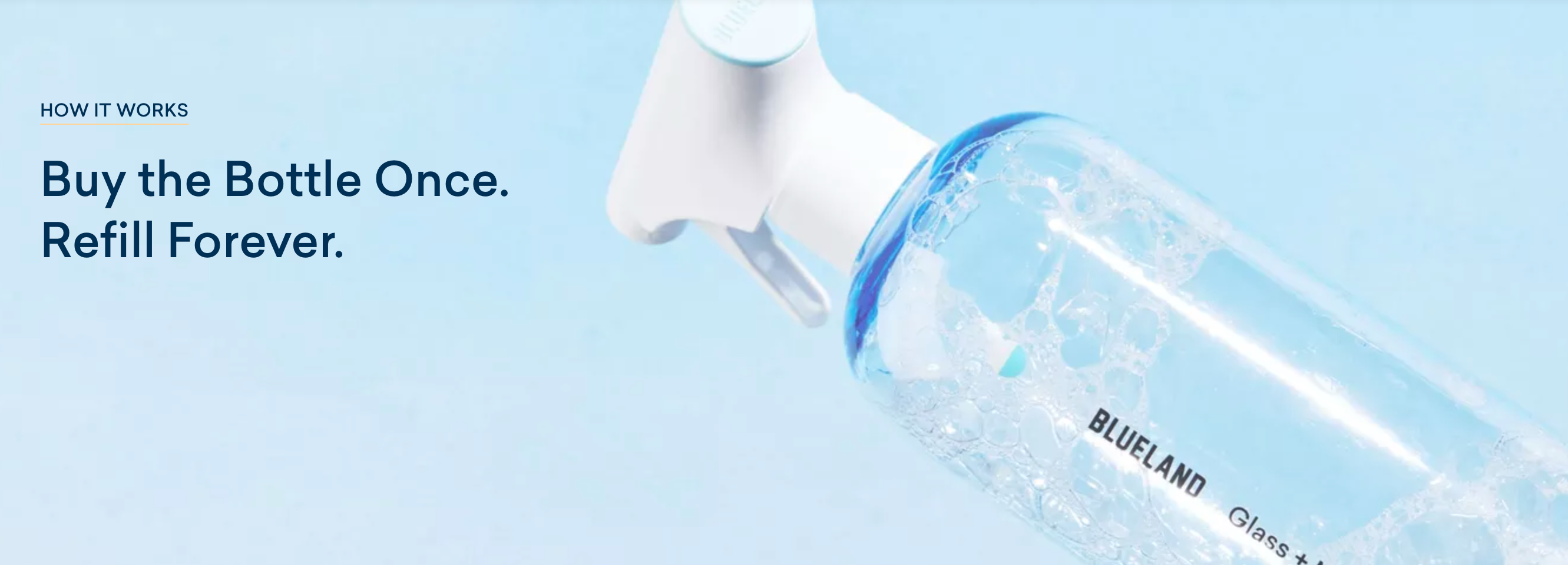
How About Poor Business Sustainability Examples?
Sometimes examples of what not to do can be as helpful as a shining role model. As far as sustainability is concerned, as long as your efforts are genuine and making a difference, you’re in the clear. Where you run into trouble is with greenwashing: the practice of lying about or over-crediting your business’s green efforts.
When you greenwash, you end up on sites like greenwash.com. Check it out for examples of what not to do.
We also talk about different types of greenwashing in our article on how to avoid it.
Become a Sustainable Company
Excited about the possibilities but need more guidance? (Or unsure if it’s worth the effort?) We’ve got good news in the form of a sustainable ecommerce guide. Peep all the data-backed benefits, a thorough list of sustainable practices with implementation tips, and seven steps to help you stick with it.

